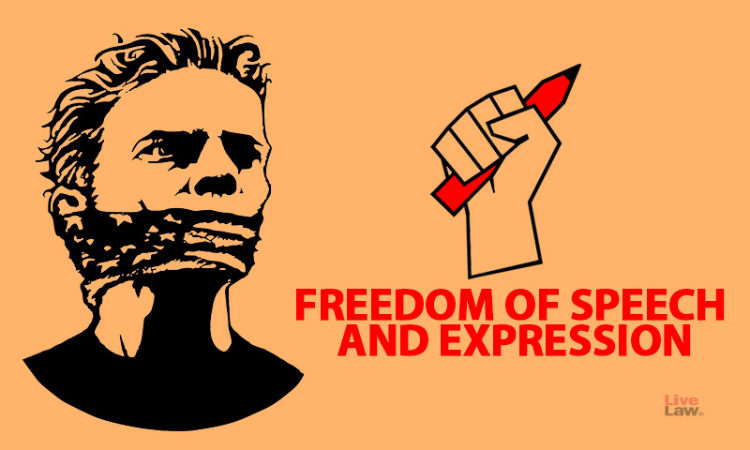No Criticism Culture!
Dr Yogesh Pratap Singh
19 Aug 2020 11:01 AM IST

Freedom of Speech and Expression
If you criticize PM, you may be branded as anti-national, if you criticize government, you may be prosecuted for sedition, if you are Muslim and criticize government you may be declared as terrorist, if you criticize legislators, you may be liable for breach of privilege and if you criticize a judge, it becomes contempt of court. These attributes may be given a colour of Rule of Law but definitely cannot be the characteristics of a modern and progressive democratic republic.
In 1950, we the people of India made a new but paradoxical beginning by drafting a new constitution which emphasized immensely on the liberty, freedom and equality. Unfortunately, we embraced all the colonial laws which were enacted by the alien government with an entirely different motive and object. Land acquisition Act, Forest Act, Official Secrets Act, Indian Penal Code, Indian Police Act are few such stringent enactments which were enacted by British to assert its authority and power over Indian citizen.
Though, Constitution of India provided under Article 13 (1) that any existing laws if found inconsistent with constitution especially with fundamental rights as incorporated in part III will be void to the extent of its inconsistency. But this was not simple. There was no automatic or specific process of filtering all these colonial unconstitutional laws and provisions. This process was difficult also because people who were supposed to administer the constitution and old colonial laws were still working with the colonial mindset. It took around 35 years to decrypt that Section 303 of IPC which was made for the protection of British jail officials is unconstitutional and violative of Article 14 and 21. Similarly, it took 70 years to declare that section 377 is an archaic and unconstitutional provision and cannot be sustained.
The same mindset is mirrored while dealing with privileges of our legislators and judges as conferred by the Contempt of Court Act. Constitution provided that subject to law made by the legislature, members will enjoy privileges which were available to members of House of Commons. The blanket acceptance of the unwritten privileges of the British House of Commons by the legislatures, functioning under a written constitution which guarantees a set of fundamental rights like the freedom of speech and expression has generated much conflict between the legislature and the judiciary as guardian of the fundamental rights. But, the custodian of rights overlooks spirit of constitution when it collides with its own antiquated privilege i.e. contempt of court.
The Contempt of Court also had its origin in England where the King, who was considered as incarnation of God and besides being the head of the administrative and legislative wing, also worked as the fountain-head of justice. But now this adjudicatory role has been shifted from Angles to human being trained in law and therefore, divine origin and divine function concept now does not fit fine with the idea of a constitutional democracy. The Contempt of Courts Act was a colonial law when it was passed in 1926. It was first replaced by the Act of 1952 and finally by the 1971 Act. One may be surprised to know that even 1971 Act which was passed by our Independent Parliament did not provide truth as a defence. It was added much later by the contempt of Courts Amendment Act, 2006.
United Kingdom and United States of America have made substantial amendments in their contempt law in order to constrain the powers of judges who might otherwise have acted to vindicate their authority and majesty which are anathema to a democratic institution. The U.K. Law Commission in its 2012 report recommended the abolition of the law of contempt by saying that the law was originally intended to maintain a "blaze of glory" around courts. Surprisingly, our Law Commission observed that there are high number of contempt cases which justify the relevance of this Act. When countries where contempt power originated are diluting and repealing it, our Supreme Court is taking suo motu cognizance of its contempt and then create a bench of handpicked judges to punish the accused. People may raise objection on the composition of bench led by a judge who has praised PM as visionary and the accused before him is someone who has been a strong and constant critic of the government?
The Supreme Court of India for long has been a people's court and has been pronouncing judgments for the betterment of human lives. But, there has been phases which has invited severe criticism. Contemporary Supreme Court is also struggling with questions of fairness, transparency and accountability which are the bedrock of an effective and independent judicial system. Rising pendency with a backlog touching 3.3 crore cases, opaque judicial appointments allegedly under executive pressure, frequent corruption charges in SC, open differences between senior judges on crucial matters, revolt of four senior most judges on the functioning of CJI, alleged sexual harassment against CJI, judges praising executive openly and SC constantly siding with the government appears to be a new normal in the Supreme Court. An extremely prompt relief for privileged class, exceptionally speedy hearing in contempt case and 'quick dismissal' or 'wait in virtual queues' for people struggling for their life, liberty and livelihood has diluted SC's reputation as people's court. The need of this time was to restore the confidence amongst citizens by upholding constitutional values and principles for the betterment of citizen's life. But unfortunately SC choose to take a different path to maintain its authority and majesty i.e. by asserting its contempt power. This is only deepening the continued anxiety of people in the institution.
Views are personal only.
(Author is a Professor of Law at National Law University Odisha)


